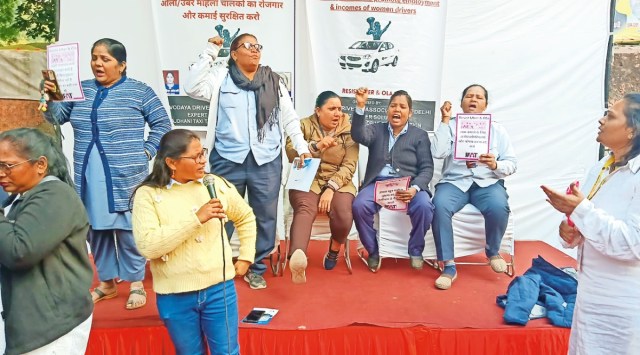Every day, like clockwork, 42-year-old Neelam Sharma gets up early in the morning. After finishing her household chores, she readies herself to report to work. Sharma, however, is not any other working woman. And her workplace is not a cushy office with a computer but her rented car.
A driver with cab aggregator service Uber for the last four years, Sharma says her job has given her the much-needed financial freedom even as she faces gender-based discrimination on a regular basis. “A man called me jhadu-poche wali and told me I shouldn’t drive… I can’t count the rides that have been cancelled for no fault of mine,” she says.

 Neelam Sharma
Neelam Sharma
Sharma is among countless women in Delhi who are part of the gig economy, which though promises to offer them flexible work hours, also, at times, leaves them vulnerable to unruly customers, abrupt change in company policies, job insecurity and prejudice against women.
Ayesha Khatoon (29), mother of five, used to work at a salon until a few years ago but decided to take up the job of a food delivery executive due to the flexible work hours. “I work for four hours in the morning and four at night. This helps me check in on my children,” says Khatoon, who works for Zomato. However, she expresses dissatisfaction at the alleged pay cuts the company has been imposing of late. “My work at the salon would fetch me better pay. The delivery job, which earlier used to fetch me Rs 30 per 3 km, earns me only Rs 15 now. I used to love the work, but it has become difficult to sustain now,” says Khatoon, alluding to the recent changes in the payout structure for delivery workers.
Pay structure aside, women gig workers have to face daily challenges with the sector, and the outside world in general, skewed heavily towards men. The plight of the women cab drivers is particularly noteworthy due to the long-held belief that women are bad drivers.
Says Sheetal (45), who works with a cab aggregator and has owned a driving licence for 17 years: “I have had many people cancel when they see my name.”
 Shivani
Shivani
Shivani (36) says customers pick fights as soon as they get to know her gender. “At least two rides get cancelled right after booking every day,” she adds.
Story continues below this ad
Then there is also the issue of harassment. Drunk men tend to misbehave but the drivers usually don’t cancel or raise a complaint for fear of losing income, says Sheetal.
But sometimes, the unruly behaviour tends to get out of hand, like it did in the case of Priyanka Devi, a driver with Uber, who was allegedly assaulted by a group of men in January. “I was told (by the company) I have been credited with some money but that has not been reflected in my account. Now, I work with other ride aggregators more. Some companies have a commission of 10% compared to Uber’s whopping 40%, and it is not worth the risk,” she says. Priyanka, who resumed work in April, alleges that even as complaints regarding customers’ behaviour go unheard, the ID of the drivers gets temporarily blocked if people repeatedly cancel rides.
However, Uber refutes the claims. According to a spokesperson, “Priyanka went through a horrible experience… As soon as we learnt about it, we immediately got in contact with her to offer assistance. We provided financial support to her for any loss of earnings… And we helped her claim her medical expenses under Uber’s on-trip insurance policy…”
 Priyanka Devi
Priyanka Devi
Says Tinku Das, 30, who works for a food delivery app: “When I was delivering food on Holi, a man asked me to come up to his home and passed lewd comments when I was there. I quickly called the app support and they took the matter up with him.”
Story continues below this ad
Besides the constant fear of getting physically assaulted, there are other issues that women gig workers have to grapple with regularly. One of these is lack of access to bathrooms. “When I get long rides, it is hard to find a public washroom, leave alone a clean one. Even if we park at a petrol station, customers express discomfort. I wait till customers have left,” says Sheetal.
And after a long day of physically taxing work, the women have to deal with domestic chores with their mostly inadequate pay leaving them with little money to afford help.
Says Sharma, a single mother, who used to work as a tailor before she took up a driving gig with Uber for better income following her husband’s death: “I wake up early to do chores. I work for 10-11 hours. I pay Rs 15,000 for fuel, Rs 12,000 as rent for the car, which leaves around Rs 15,000 for my family of four.” Sheetal has to cook and clean before taking up her 10-hour shift. “It is not like I can afford domestic help,” she said.
Chiara Furtado, researcher at the Centre for Internet and Society, says since women make up only 0.5 and 1% of the workforce in these two sectors – food delivery and cab-hailing industry – the standardised policies for workers end up being gendered. “Algorithm incentivises longer hours of work, late shifts, peak hours and consecutive rides, which prove to be discriminating against women,” she adds.
Story continues below this ad
Furtado says that findings have revealed that in times of crisis, most safety mechanisms tend to be more restrictive and end up curtailing the freedom and agency of women. Khatoon elucidates Furtado’s point with her own example. “I ride an e-scooter and don’t get orders to spots above a distance of 5 km. This decreases my area and income. Those who can travel 20 km get Rs 100 per ride,” she says.
“Companies claim to offer insurance, but the way they externalize fuel costs, they externalize risk and safety costs too. Apart from general safety, they have other grievances, such as toilets, which have gender underpinnings to it,” says Furtado.
Mohit Sardana, Chief Operations Officer (COO) for food delivery at Zomato, says the app provides insurance to its delivery persons, including against death, disability, funeral expenses, ambulance cover and hospitalisation, and also gives a minimum guarantee price for every order. He says the impact of having an Electric Vehicle (EV) is not gendered as men also rely on such vehicles.
While women in most offices find comfort and support in other female colleagues, most women gig workers are not even aware of other women working in the sectors. The fact that they are not part of any unions makes their everyday battles particularly lonely.
Story continues below this ad
Dharmendra Kumar, convenor of the Gig Workers’ Association (GIGWA), says companies engaging in gig work don’t consider such workers as employees. “This results in lack of access to Indian laws and deprives them of protection from unreasonable termination, provident fund, gratuity and ESIC. Along with the vacuum created by the lack of job security, social security also remains absent,” he adds.
Shaik Salauddin, national general secretary, Indian Federation Of App-Based Transport Workers (IFAT), says it is the duty of both the government and the companies to ensure the safety and security of women. “Concerns around toilets have frequently been raised by women. Besides, they should be given at least three days off work as menstrual leave every month,” he adds.
Despite the challenges, for a number of women, gig work remains the only means to lift their family out of poverty while being present for them as and when needed. “I can’t take long shifts because I have school-going children. My husband doesn’t have a steady job, which makes it hard for me to drop out of this job,” says Das, who earns around Rs 12,000 per month.



 Neelam Sharma
Neelam Sharma Shivani
Shivani Priyanka Devi
Priyanka Devi





